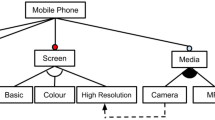Abstract
The combination of testing techniques is considered an effective strategy to evaluate the quality of a software product. However, the selection of which techniques to combine in a software project has been an interesting challenge in the software engineering field because the high number of techniques available at the technical literature. This paper presents an approach developed to support the combined selection of model-based testing techniques, applying multiobjective combinatorial optimization strategies, by determining the minimum dominating set in a bipartite and bi-weighted graph. Thus, an evolutionary strategy based on a multiobjective genetic algorithm is proposed to generate trade-off techniques subsets between the maximum coverage of software project characteristics and the minimum eventual effort to construct models used for test cases generation. In an empirical evaluation, our evolutionaryalgorithmstrategygavebetterresultsthanthepreviousapproaches.
Access this chapter
Tax calculation will be finalised at checkout
Purchases are for personal use only
Preview
Unable to display preview. Download preview PDF.
Similar content being viewed by others
References
Juristo, N., Moreno, A., Vegas, S.: Reviewing 25 years of testing technique experiments. Empirical Software Engineering: An International Journal 9(1), 7–44 (2004)
Menzies, T., Owen, D., Cukic, B.: ―Saturation Effects in Testing of Formal Models‖. In: 13th international Symposium on Software Reliability Engineering (ISSRE 2002), Washington, DC, p. 15 (2002)
Wojcicki, M.A., Strooper, P.: An Iterative Empirical Strategy for the Systematic Selection of a Combination of Verification and Validation Technologies. In: Proceedings of the 5th International Workshop on Software Quality, May 20-26 (2007), http://dx.doi.org/10.1109/WOSQ.2007.4
Vegas, S., Basili, V.: A Characterization Schema for Software Testing Techniques. Empirical Software Engineering 10(4), 437–466 (2005)
Victor, M., Upadhyay, N.: Selection of Software Testing Technique: A Multi Criteria Decision Making Approach. In: Nagamalai, D., Renault, E., Dhanuskodi, M. (eds.) CCSEIT 2011, Part 1. CCIS, vol. 204, pp. 453–462. Springer, Heidelberg (2011)
Dias-Neto, A.C., Travassos, G.H.: Model-based Testing Approaches Selection for Software Projects. Information and Software Technology 51, 1487–1504 (2009)
Dias-Neto, A.C., Travassos, G.H.: A Picture from the Model-Based Testing Area: Concepts, Techniques, and Challenges. Advances in Computers 80, 45–120 (2010)
Papadimitriou, C., Steiglitz, K.: Combinatorial Optimization: Algorithms and Complexity. Chapman & Hall and CRC Press, New York (2004)
Talbi, E.: Metaheuristics: from design to implementation. Wiley Series on Parallel and Distributed Computing series. John Wiley & Sons (2009)
Abraham, A., Jain, L., Goldberg, R.: Evolutionary Multiobjective Optimization. Theoretical Advances and Applications. Springer, USA (2005)
Dias-Neto, A.C., Travassos, G.H.: Evolving a Computerized Infrastructure to support the Selection of Model-Based Testing Techniques. In: IFIP International Conference on Testing Software and Systems (ICTSS 2010), Brazil (2010)
Author information
Authors and Affiliations
Editor information
Editors and Affiliations
Rights and permissions
Copyright information
© 2012 Springer-Verlag Berlin Heidelberg
About this paper
Cite this paper
da Silva Grande, A., Neto, A.C.D., de Freitas Rodrigues, R. (2012). Providing Trade-Off Techniques Subsets to Improve Software Testing Effectiveness: Using Evolutionary Algorithm to Support Software Testing Techniques Selection by a Web Tool. In: Barros, L.N., Finger, M., Pozo, A.T., Gimenénez-Lugo, G.A., Castilho, M. (eds) Advances in Artificial Intelligence - SBIA 2012. SBIA 2012. Lecture Notes in Computer Science(), vol 7589. Springer, Berlin, Heidelberg. https://doi.org/10.1007/978-3-642-34459-6_23
Download citation
DOI: https://doi.org/10.1007/978-3-642-34459-6_23
Publisher Name: Springer, Berlin, Heidelberg
Print ISBN: 978-3-642-34458-9
Online ISBN: 978-3-642-34459-6
eBook Packages: Computer ScienceComputer Science (R0)




